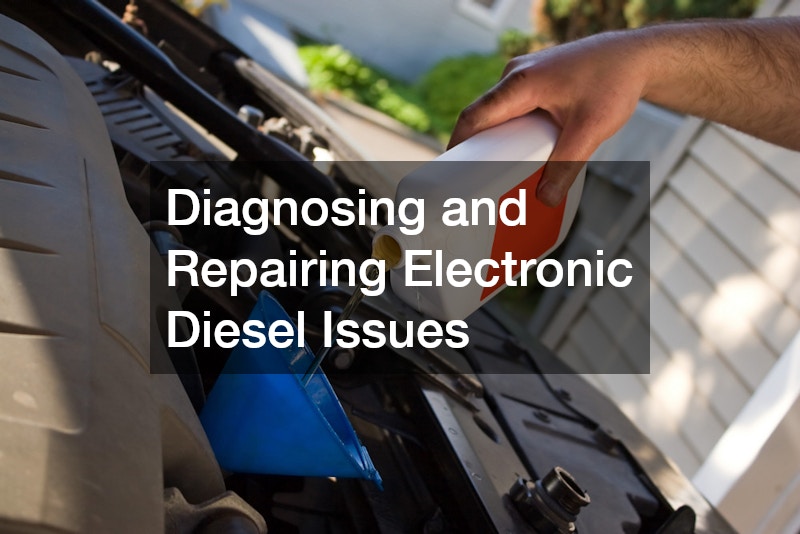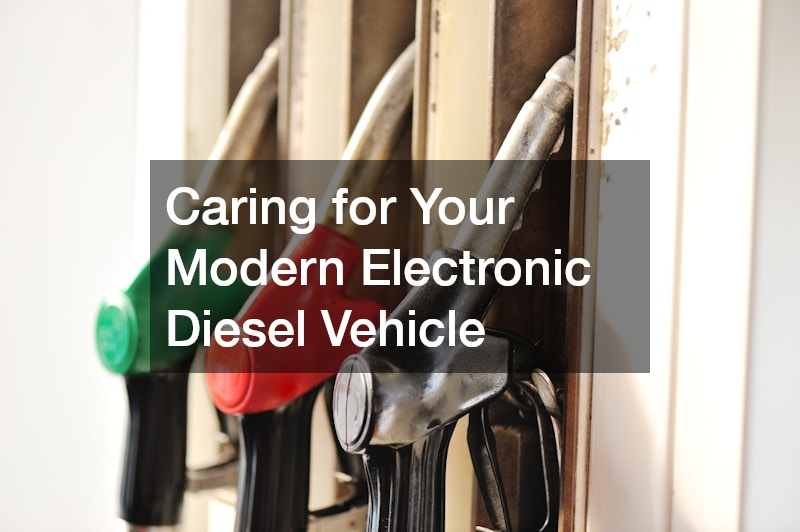Caring for Your Modern Electronic Diesel Vehicle

Caring for Your Modern Electronic Diesel Vehicle
In this comprehensive guide, we’ll cover everything you need to know about maintaining and caring for your modern electronic diesel vehicle. With advancements in technology and increasing environmental regulations, electronic diesel vehicles have become a popular choice among drivers. Whether it’s a sedan, heave duty pickup or a tractor trailer, this article will help you navigate the specifics of keeping your vehicle in top shape.
Unique Features of Electronic Diesel Vehicles

Diesel-powered vehicles have undergone significant advancements in recent years, particularly with the integration of electronic systems. These improvements have enhanced their efficiency, performance, and environmental sustainability, making them a viable option for both commercial and personal transportation. Below are some key features that set modern electronic diesel vehicles apart.
Advanced Engine Technologies
Modern electronic diesel engines incorporate cutting-edge technologies to optimize combustion, power output, and fuel efficiency. High-pressure fuel injection systems, such as common rail direct injection (CRDI), enable precise fuel delivery, improving combustion efficiency and reducing fuel wastage. Turbocharging further enhances performance by increasing air intake, allowing for more efficient fuel burning. Additionally, advanced combustion strategies, including variable valve timing and exhaust gas recirculation (EGR), contribute to improved engine responsiveness and lower emissions.
Fuel Efficiency Benefits
Diesel engines have long been recognized for their superior fuel economy compared to gasoline engines. Their higher thermal efficiency and energy-dense fuel composition allow diesel vehicles to travel longer distances per gallon, making them particularly advantageous for long-haul transportation and fleet operations. The improved efficiency translates to lower fuel costs, making diesel-powered vehicles a preferred choice in industries that rely on heavy-duty vehicles, such as logistics and construction.
Environmental Considerations
With growing concerns over emissions and environmental impact, modern diesel vehicles incorporate several technologies to comply with stringent emission regulations. Selective Catalytic Reduction (SCR) systems use a urea-based solution (DEF, or Diesel Exhaust Fluid) to break down nitrogen oxides (NOx) into harmless nitrogen and water vapor. Diesel Particulate Filters (DPFs) trap and remove particulate matter (soot) from exhaust gases, reducing air pollution. These advancements have significantly lowered the environmental footprint of diesel engines while maintaining their efficiency and power.
Integration of Electronic Systems
One of the most significant advancements in diesel vehicles is the integration of electronic control units (ECUs) and sensor-based technologies. ECUs continuously monitor various engine parameters, such as fuel injection timing, air intake, and exhaust emissions, to optimize performance in real time. Advanced diagnostics systems help detect potential issues early, reducing maintenance costs and downtime. Additionally, electronic stability control, adaptive cruise control, and telematics systems enhance both safety and driver convenience, further modernizing diesel-powered transportation.
Comparison with Traditional Diesel Engines
Compared to older diesel models, electronic diesel engines offer significant advantages in terms of fuel economy, emissions control, and overall performance. Traditional mechanical diesel engines rely on fixed fuel injection timing and mechanical governors, leading to inefficiencies and higher emissions. In contrast, electronic diesel engines utilize advanced digital control systems, allowing for precise fuel metering, adaptive performance tuning, and real-time adjustments based on driving conditions. This not only improves power output and fuel efficiency but also ensures compliance with increasingly stringent environmental regulations.
Impact of the Electronic Control Module (ECM) on Performance

Understanding the Electronic Control Module (ECM)
The ECM serves as the brain of a modern diesel engine, continuously monitoring and adjusting engine parameters to maintain optimal operation. It processes input from various sensors—including air intake, coolant temperature, fuel pressure, and exhaust emissions—to dynamically regulate fuel injection, turbocharger boost, and emissions control systems. By doing so, it enhances efficiency, reduces fuel consumption, and minimizes harmful emissions.
ECM and Engine Optimization
The ECM continuously collects and analyzes data from multiple engine sensors to fine-tune performance under varying conditions. By adjusting injection timing, fuel delivery, and air-to-fuel ratios, the ECM ensures that the engine runs smoothly whether at idle, under load, or during acceleration. This level of optimization leads to better throttle response, reduced engine wear, and extended component lifespan.
Diagnostic Capabilities of ECM
One of the key benefits of an ECM is its ability to detect, log, and communicate engine faults through onboard diagnostics. When a malfunction occurs—such as abnormal fuel pressure, sensor failure, or emissions system inefficiency—the ECM generates fault codes that can be retrieved using diagnostic tools. These fault codes help technicians quickly identify and address mechanical or electronic issues, reducing downtime and maintenance costs.
Importance of ECM Software Updates
Regular software updates play a crucial role in keeping the ECM functioning optimally. Manufacturers release updates to improve fuel mapping, correct potential software bugs, and ensure compliance with evolving emissions regulations. These updates can enhance performance, increase fuel efficiency, and extend the engine’s operational life by adapting to new fuel formulations and regulatory requirements.
Troubleshooting ECM Issues
Issues with the ECM can lead to various engine performance problems, including rough idling, reduced power, increased fuel consumption, or failure to meet emissions standards. A malfunctioning ECM may be caused by software corruption, sensor failures, or electrical issues. Prompt diagnostics and repairs—such as resetting the ECM, replacing faulty sensors, or updating the firmware—are essential to restore optimal engine performance and prevent long-term damage.
Improving the Longevity of Your Diesel Engine
Proper maintenance, combined with smart driving habits, can significantly extend the lifespan of a diesel engine.
Adopting Proper Driving Habits
Aggressive acceleration, excessive idling, and short trips can put unnecessary strain on a diesel engine. Allowing the engine to warm up before heavy use, avoiding sudden throttle changes, and reducing idle time helps minimize wear and tear. For long-term health, diesel engines benefit from regular highway driving, which helps burn off carbon deposits and keeps the exhaust system clean.
The Role of Quality Fuel and Additives

Using high-quality diesel fuel with low sulfur content helps prevent carbon buildup, injector clogging, and poor combustion. Additionally, diesel fuel additives can improve lubrication, clean fuel injectors, and enhance cold-weather performance by preventing fuel gelling. Always ensure that fuel tanks are kept relatively full to reduce condensation buildup, which can introduce water into the fuel system. It may also be helpful to keep your electronic diesel vehicle in climate controlled car storage if you live in a cold climate; as diesel fuel can become thick and gel like when exposed to low temperatures for an extended period of time.
Importance of Cooling System Maintenance
Diesel engines run at high temperatures, making an efficient cooling system essential. Regularly inspecting the radiator, coolant levels, and hoses helps prevent overheating and costly engine damage. Flushing and replacing the coolant at recommended intervals ensures optimal performance and prevents corrosion within the cooling system.
Detecting and Responding to Unusual Noises
Strange sounds such as knocking, hissing, or whistling can indicate issues within the engine or turbocharger. For example:
- Knocking – May signal injector problems or improper combustion.
- Hissing – Could indicate a vacuum or exhaust leak.
- Whistling – May be a sign of a failing turbocharger or boost leak.
Addressing unusual noises early can prevent further damage and costly repairs.
Storing Your Vehicle Correctly
If a diesel vehicle will be stored for an extended period, taking proper precautions prevents degradation and damage.
- Use a fuel stabilizer to prevent fuel from breaking down.
- Disconnect the battery or use a trickle charger to maintain charge.
- Store in a dry, climate-controlled area to prevent rust and electrical issues.
- Periodically start the engine to circulate fluids and keep components lubricated.
Following these steps helps ensure the vehicle remains in good condition even after long periods of inactivity.
Diesel Exhaust Fluid (DEF) and Its Importance
Modern diesel vehicles are equipped with DEF systems to meet strict emission regulations. Understanding how DEF works and how to maintain it is crucial for vehicle owners.
Purpose of DEF in Modern Diesels
DEF is a urea-based solution that works with Selective Catalytic Reduction (SCR) technology to reduce nitrogen oxide (NOx) emissions. By injecting DEF into the exhaust stream, harmful pollutants are broken down into harmless nitrogen and water vapor, making diesel engines more environmentally friendly.
How to Properly Handle and Store DEF
DEF is sensitive to temperature and contamination. To ensure effectiveness:
- Store DEF in a cool, dry place away from direct sunlight.
- Keep the container sealed to prevent contamination.
- Avoid using expired DEF, as its effectiveness diminishes over time.
Common Misconceptions About DEF
There are several myths about DEF that need clarification:
- DEF is not a fuel additive – It is injected into the exhaust, not mixed with diesel fuel.
- DEF does not enhance performance – It purely serves to reduce emissions.
- Running out of DEF does not damage the engine – However, it will put the vehicle into a reduced-power mode until refilled.
Troubleshooting DEF System Issues
Low-quality DEF or issues within the SCR system can trigger warning lights or performance reductions. Common problems include:
- Crystallization in the DEF injector
- Sensor malfunctions
- Contaminated or expired DEF
Regularly inspecting the DEF system and using high-quality DEF products ensures smooth operation and compliance with emissions regulations.
The Environmental Impact of DEF
By reducing harmful NOx emissions, DEF plays a vital role in improving air quality and reducing the environmental footprint of diesel vehicles. The use of DEF has allowed diesel technology to remain viable while meeting increasingly stringent global emissions standards.
Diagnosing and Repairing Electronic Diesel Issues

Identifying Common Diagnostic Trouble Codes (DTCs)
Understanding DTCs can help pinpoint issues related to sensors, fuel systems, and emissions controls. These codes, retrieved using an OBD-II scanner, provide valuable insights into engine performance and potential malfunctions. Interpreting them correctly allows for timely repairs, preventing minor issues from escalating into major mechanical failures.
Tools and Equipment for Diagnostics
Professional diagnostic tools help read and clear trouble codes efficiently.
When to Seek Professional Help
Complex electronic and mechanical issues should be handled by qualified technicians. If your modern electronic diesel vehicle happens to leaves you stranded, it’s important to contact a towing service that is experienced with towing heavy vehicles. If your truck is 4WD, you should also confirm that they’re aware of any necesarry precautions that may warrant. Failure to do so can result in damage to your tires, or even you entire drivetrain.
DIY Repairs vs. Professional Repairs
While basic maintenance can be done at home, advanced repairs require specialized knowledge and tools. In these cases, it’s crucial to choose an auto repair shop that specializes in diesel truck repair.
.
The Importance of Manufacturer Guidelines
Following manufacturer recommendations ensures repairs and updates are performed correctly.
Achieving Fuel Efficiency in Electronic Diesel Vehicles
Role of Turbochargers
Turbochargers improve fuel efficiency by enhancing engine power without increasing fuel consumption.
The Impact of Aerodynamics
Reducing drag through aerodynamic designs and accessories enhances fuel efficiency.
Benefits of Start-Stop Technology
This feature conserves fuel by shutting off the engine when the vehicle is idling.
Tire Pressure and Fuel Economy
Maintaining optimal tire pressure reduces rolling resistance and improves mileage.
Monitoring and Modifying Driving Habits
Smooth acceleration, proper gear usage, and speed regulation contribute to fuel savings.
The Role of Technology in Diesel Vehicle Connectivity
Incorporation of Smart Technology
Modern diesel vehicles integrate advanced telematics and smart features for convenience and efficiency.
Benefits of Telematics Systems
Fleet management and real-time diagnostics are enhanced through telematics systems.
Driver Experience and Connectivity Features
Infotainment, GPS navigation, and hands-free communication improve the driving experience.
Security Concerns with Connected Vehicles
Cybersecurity measures are essential to protect electronic systems from hacking threats.
Future Trends in Diesel Connectivity
Artificial intelligence and vehicle-to-vehicle communication are expected to revolutionize diesel technology.
Safeguarding Your Vehicle’s Electronic Systems
Understanding Vulnerabilities in Electronic Systems
Electronic diesel vehicles are susceptible to hacking, system failures, and sensor malfunctions.
Steps to Protect Against Cyber Threats
Regular software updates and secure passwords help prevent unauthorized access.
Importance of Regular System Updates
Keeping software up to date ensures optimal performance and security.
Securing Wireless Communications
Encrypted connections and authentication measures protect vehicle data.
Best Practices for Electronic System Maintenance
Routine inspections and avoiding unnecessary modifications help maintain system integrity.
Comparing Hybrids and Electronic Diesel Vehicles
Evaluating Performance Differences
Diesel engines offer higher torque, making them ideal for towing and heavy loads, while hybrids provide better fuel economy, especially in stop-and-go urban settings due to regenerative braking and electric assist.
Emissions and Environmental Impact
Hybrids produce fewer emissions overall, particularly in city driving, but modern diesel engines have significantly improved with advanced emissions control technologies like selective catalytic reduction (SCR) and diesel particulate filters (DPF).
Cost Analysis: Initial Investment vs. Long-Term Costs
Diesel vehicles may have higher upfront costs due to engine complexity and emissions systems. For instance, diesel injector repair is costly, but with proper maintenance isn’t a regular occurrence. Diesels also offer lower fuel expenses and longer engine life, making them cost-effective for high-mileage drivers.
The Driving Experience: Diesel vs. Hybrid
Diesel vehicles provide robust performance, particularly in terms of acceleration and highway driving, while hybrids emphasize smooth, quiet operation with seamless transitions between electric and gasoline power.
Future of Hybrid and Diesel Technologies
Both technologies continue to evolve, with hybrids advancing in battery efficiency and diesel engines improving emissions controls, leaving room for innovation in fuel efficiency, sustainability, and alternative fuels.
Advancements in hybrid and diesel technologies will continue to shape the automotive industry.
Caring for your modern electronic diesel vehicle involves understanding both the mechanical and electronic aspects of the car. By staying informed about the latest technologies and maintenance practices, you can ensure the best performance and longevity for your vehicle. Embrace the future of diesel with confidence and enjoy the benefits of a well-maintained ride.
